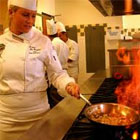I spent the five happiest years of my life in a morgue. As a forensic scientist in the Cleveland coroner’s office I analyzed gunshot residue on hands and clothing, hairs, fibers, paint, glass, DNA, blood and many other forms of trace evidence, as well as crime scenes. Now I'm a certified latent print examiner and CSI for a police department in Florida. I also write a series of forensic suspense novels, turning the day job into fiction. My books have been translated into six languages.
I don’t even know what my IQ is. It’s hard to judge stupidity, since most crimes seem really stupid if you look at the benefits versus the risks. And if the criminals were brilliant, ideally, they could keep anyone from knowing a crime was even committed. Most murders are not premeditated—an argument gets out of control, so suddenly the killer has to figure out what to do, this is a situation they didn’t expect, and they’re highly agitated, so they don’t do a great job of covering up. And then more intentional crimes, burglary, vehicle theft, drug dealing—well, if they were smart, they’d get into more lucrative lines of work.
At my agency we’d be calling either Dispatch or, less likely, another person, in which case we’d use their badge number. What people call their dispatch unit, base, station, (we call them the name of the city, the first word in ‘such and such police department) probably depends on the habits of that particular agency. In other words there is no difference. Hope that helps!
I’m sorry but I’m not familiar with what K2 is.
I can't click on links I don't recognize. What's it about?
Chef
 Do you get offended when a customer sends back a dish?
Do you get offended when a customer sends back a dish?
Firefighter
 What's the worst you've been burned in a fire?
What's the worst you've been burned in a fire?
Border Patrol Agent
 When you catch an illegal alien crossing the border, is he deported immediately?
When you catch an illegal alien crossing the border, is he deported immediately?
They would put themselves at risk of contracting kuru, which is similar to Creutzfeldt-Jacob disease.
If you're trying to ask something, you need to be more specific.
What is it you’re going to want to know about them, because I may or may not be able to help.
-OR-
 Login with Facebook
Login with Facebook (max 20 characters - letters, numbers, and underscores only. Note that your username is private, and you have the option to choose an alias when asking questions or hosting a Q&A.)
(A valid e-mail address is required. Your e-mail will not be shared with anyone.)
(min 5 characters)
By checking this box, you acknowledge that you have read and agree to Jobstr.com’s Terms and Privacy Policy.
-OR-
 Register with Facebook
Register with Facebook(Don't worry: you'll be able to choose an alias when asking questions or hosting a Q&A.)